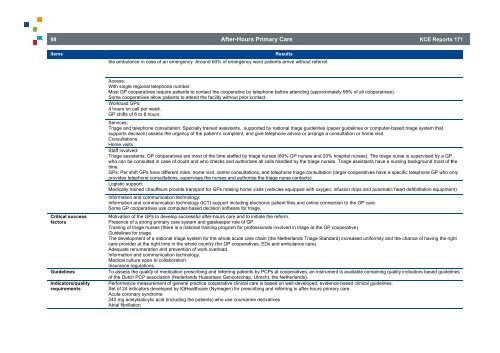Quelles solutions pour la garde en médecine générale? - KCE
Quelles solutions pour la garde en médecine générale? - KCE
Quelles solutions pour la garde en médecine générale? - KCE
Create successful ePaper yourself
Turn your PDF publications into a flip-book with our unique Google optimized e-Paper software.
98<br />
Items<br />
Critical success<br />
factors<br />
Guidelines<br />
Indicators/quality<br />
requirem<strong>en</strong>ts<br />
Affter-Hours<br />
Primaary<br />
Care<br />
Results<br />
the ambu<strong>la</strong>ncce<br />
in case of an emerg g<strong>en</strong>cy. Around 60% off<br />
emerg<strong>en</strong>cy ward pati<strong>en</strong>ts<br />
arrive without refferral.<br />
Access:<br />
With single reegional<br />
telephone num mber.<br />
Most GP coooperatives<br />
require patie <strong>en</strong>ts to contact the coooperative<br />
by telephonee<br />
before att<strong>en</strong>ding (appproximately<br />
95% of all<br />
cooperatives).<br />
Some cooperratives<br />
allow pati<strong>en</strong>ts to t att<strong>en</strong>d the facility wwithout<br />
prior contact.<br />
Workload GPPs:<br />
4 hours on caall<br />
per week.<br />
GP shifts of 6 to 8 hours.<br />
<strong>KCE</strong> Reportss<br />
171<br />
Services:<br />
Triage and teelephone<br />
consultation: : Specially trained asssistants,<br />
supported byy<br />
national triage guidelines<br />
(paper guideliness<br />
or computer-based ttriage<br />
system that<br />
supports decision)<br />
assess the urge <strong>en</strong>cy of the pati<strong>en</strong>t’s coomp<strong>la</strong>int,<br />
and give teleephone<br />
advice or arrange<br />
a consultation or home visit.<br />
Consultationss<br />
Home visits<br />
Staff involvedd:<br />
Triage assistaants:<br />
GP cooperatives s are most of the time staffed by triage nurses<br />
(80% GP nurses and<br />
20% hospital nursees).<br />
The triage nurse is<br />
supervised by a GP,<br />
who can be cconsulted<br />
in case of do oubt and who checks and authorizes all callls<br />
handled by the triagge<br />
nurses. Triage assisstants<br />
have a nursing background most of tthe<br />
time.<br />
GPs: Per shifft<br />
GPs have differ<strong>en</strong>t roles: r home visit, c<strong>en</strong>trre<br />
consultations, and ttelephone<br />
triage consultation<br />
(<strong>la</strong>rger cooperratives<br />
have a specificc<br />
telephone GP who only<br />
provides telephone<br />
consultations, supervises s the nursess<br />
and authorise the triaage<br />
nurse contacts).<br />
Logistic suppport:<br />
Medically traiined<br />
chauffeurs provid de transport for GPs mmaking<br />
home visits (veehicles<br />
equipped with ooxyg<strong>en</strong>,<br />
infusion drips and automatic heart ddefibril<strong>la</strong>tion<br />
equipm<strong>en</strong>nt)<br />
Information aand<br />
communication tec chnology:<br />
Information aand<br />
communication tec chnology (ICT) supporrt<br />
including electronic pati<strong>en</strong>t files and onlinee<br />
connection to the GP<br />
care.<br />
Some GP coooperatives<br />
use compu uter-based decision sooftware<br />
for triage.<br />
Motivation of the GPs to develop successful<br />
after-hours care and to initiate thee<br />
reform.<br />
Pres<strong>en</strong>ce of a strong primary care system and gatekeepper<br />
role of GP.<br />
Training of triiage<br />
nurses (there is a national training proggram<br />
for professionalss<br />
involved in triage at tthe<br />
GP cooperative).<br />
Guidelines foor<br />
triage.<br />
The developmm<strong>en</strong>t<br />
of a national triag ge system for the whoole<br />
acute care chain (thhe<br />
Nether<strong>la</strong>nds Triagee<br />
Standard) increasedd<br />
uniformity and the chhance<br />
of having the rigght<br />
care providerr<br />
at the right time in the e whole country (for GGP<br />
cooperatives, EDs and ambu<strong>la</strong>nce care) .<br />
Adequate r<strong>en</strong>numeration<br />
and prev<strong>en</strong>tion<br />
of work overloadd.<br />
Information aand<br />
communication tec chnology.<br />
Medical cultuure<br />
op<strong>en</strong> to col<strong>la</strong>boratio on.<br />
Insurance reggu<strong>la</strong>tions.<br />
To assess thee<br />
quality of medication n prescribing and referring<br />
pati<strong>en</strong>ts by PCPss<br />
at cooperatives, an iinstrum<strong>en</strong>t<br />
is avai<strong>la</strong>blee<br />
containing quality inddicators<br />
based guidelines<br />
of the Dutch PCP association (Ned der<strong>la</strong>nds Huisarts<strong>en</strong> GG<strong>en</strong>ootschap,<br />
Utrecht, the Nether<strong>la</strong>nds).<br />
Performance measurem<strong>en</strong>t of g<strong>en</strong>e eral practice cooperattive<br />
clinical care is bassed<br />
on well-developedd,<br />
evid<strong>en</strong>ce-based clinical<br />
guidelines.<br />
Set of 24 indiicators<br />
developed by IQHealthcare I<br />
(Nymeg<strong>en</strong>)<br />
for prescribing andd<br />
referring in after-houurs<br />
primary care.<br />
Acute coronaary<br />
syndrome<br />
240 mg acetyylsalicylic<br />
acid (including<br />
the pati<strong>en</strong>ts) who uuse<br />
coumarine derivattives<br />
Atrial fibril<strong>la</strong>tioon

















